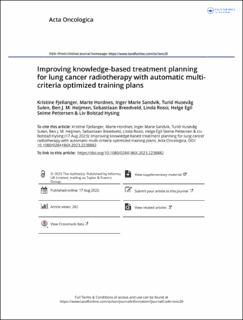| dc.contributor.author | Fjellanger, Kristine | |
| dc.contributor.author | Hordnes, Marte | |
| dc.contributor.author | Sandvik, Inger Marie | |
| dc.contributor.author | Sulen, Turid Husevåg | |
| dc.contributor.author | Heijmen, Ben J. M. | |
| dc.contributor.author | Breedveld, Sebastiaan | |
| dc.contributor.author | Rossi, Linda | |
| dc.contributor.author | Pettersen, Helge Egil Seime | |
| dc.contributor.author | Hysing, Liv Bolstad | |
| dc.date.accessioned | 2023-12-08T13:02:14Z | |
| dc.date.available | 2023-12-08T13:02:14Z | |
| dc.date.created | 2023-10-12T07:49:14Z | |
| dc.date.issued | 2023 | |
| dc.identifier.issn | 0284-186X | |
| dc.identifier.uri | https://hdl.handle.net/11250/3106647 | |
| dc.description.abstract | Background: Knowledge-based planning (KBP) is a method for automated radiotherapy treatment planning where appropriate optimization objectives for new patients are predicted based on a library of training plans. KBP can save time and improve organ at-risk sparing and inter-patient consistency compared to manual planning, but its performance depends on the quality of the training plans. We used another system for automated planning, which generates multi-criteria optimized (MCO) plans based on a wish list, to create training plans for the KBP model, to allow seamless integration of knowledge from a new system into clinical routine. Model performance was compared for KBP models trained with manually created and automatic MCO treatment plans.
Material and Methods: Two RapidPlan models with the same 30 locally advanced non-small cell lung cancer patients included were created, one containing manually created clinical plans (RP_CLIN) and one containing fully automatic multi-criteria optimized plans (RP_MCO). For 15 validation patients, model performance was compared in terms of dose-volume parameters and normal tissue complication probabilities, and an oncologist performed a blind comparison of the clinical (CLIN), RP_CLIN, and RP_MCO plans.
Results: The heart and esophagus doses were lower for RP_MCO compared to RP_CLIN, resulting in an average reduction in the risk of 2-year mortality by 0.9 percentage points and the risk of acute esophageal toxicity by 1.6 percentage points with RP_MCO. The oncologist preferred the RP_MCO plan for 8 patients and the CLIN plan for 7 patients, while the RP_CLIN plan was not preferred for any patients.
Conclusion: RP_MCO improved OAR sparing compared to RP_CLIN and was selected for implementation in the clinic. Training a KBP model with clinical plans may lead to suboptimal output plans, and making an extra effort to optimize the library plans in the KBP model creation phase can improve the plan quality for many future patients. | en_US |
| dc.language.iso | eng | en_US |
| dc.publisher | Taylor & Francis | en_US |
| dc.rights | Navngivelse 4.0 Internasjonal | * |
| dc.rights.uri | http://creativecommons.org/licenses/by/4.0/deed.no | * |
| dc.title | Improving knowledge-based treatment planning for lung cancer radiotherapy with automatic multi-criteria optimized training plans | en_US |
| dc.type | Journal article | en_US |
| dc.type | Peer reviewed | en_US |
| dc.description.version | publishedVersion | en_US |
| dc.rights.holder | Copyright 2023 The Author(s) | en_US |
| cristin.ispublished | true | |
| cristin.fulltext | original | |
| cristin.qualitycode | 1 | |
| dc.identifier.doi | 10.1080/0284186X.2023.2238882 | |
| dc.identifier.cristin | 2183931 | |
| dc.source.journal | Acta Oncologica | en_US |
| dc.source.pagenumber | 1194-1200 | en_US |
| dc.identifier.citation | Acta Oncologica. 2023, 62 (10), 1194-1200. | en_US |
| dc.source.volume | 62 | en_US |
| dc.source.issue | 10 | en_US |

